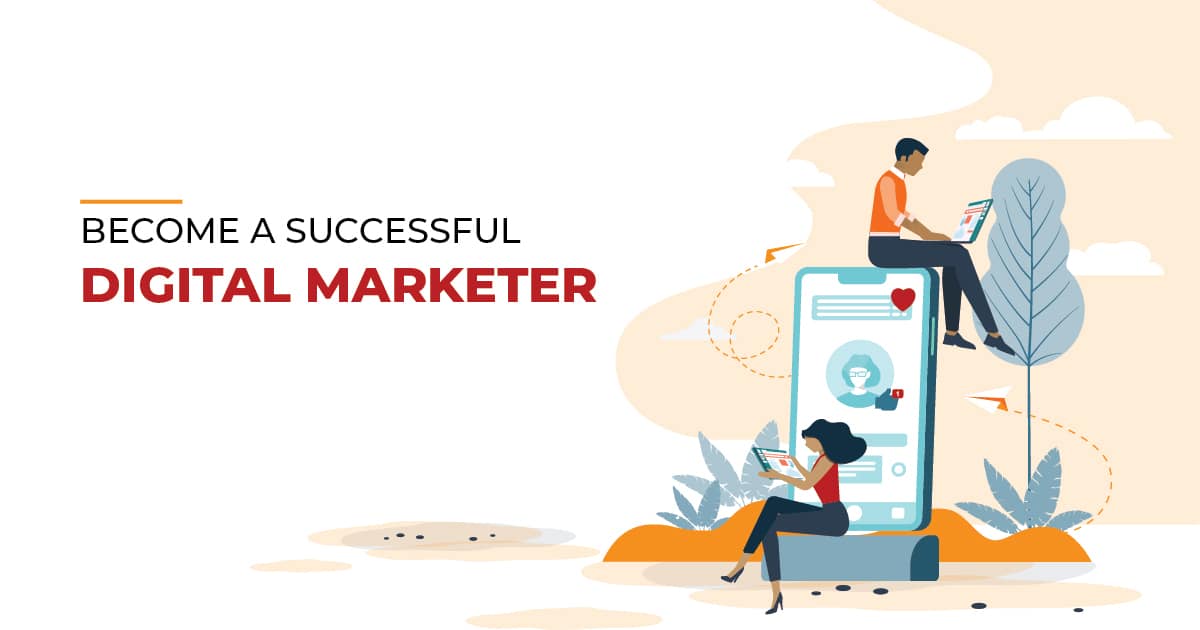Let’s face it; there is no getting around the fact that nearly all businesses, regardless of their size, soon or later, must incorporate technology in their marketing activities.
Currently, the demand for digital marketers appears to outweigh the supply. That means there are many opportunities for individuals looking to get into this industry.
Digital marketing has been in existence for years and is still evolving. With numerous advancements in technology, invention of new tools, and the emergence of various career paths in the field of digital marketing, it is very tricky for people to fully figure out an appropriate career to choose in digital marketing.
With the ease at which the internet is accessed today, the number of individuals going online is steadily increasing. According to a study done by Pew Research, internet usage among adults shot up to more than 54% using the internet daily.
Therefore, with such a large number of people going online currently, both businesses and non-profit organizations have to align their marketing strategies and tap into this phenomenon.
Digital marketers, therefore, have to monitor different market trends to be able to come up with appropriate methods of making sure their brands reach out to as many customers as possible.
Digital marketing is supported by two main pillars: Online marketing and offline marketing. Online marketing includes 7 major categories:
Search Engine Optimization (SEO)
Refers to the process of making websites rank or appear higher in search engine results pages (SERPs). The right SEO strategy plays an integral role in attracting relevant traffic to your website. Channels that benefit largely from this include blogs, infographics platforms, and other websites.
Content Marketing
This entails creation and promotion of relevant pieces of content for purposes of generating traffic and brand awareness. Mediums that are commonly used for this are blog posts, eBooks and white papers, and online brochures. Read more on how to become an excellent Content Marketer.
Social Media Marketing (SMM)

Social media marketing basically involves the use of social media to drive traffic and generate leads to your website. Generally, most marketers prefer giant social platforms such as Facebook, Twitter, LinkedIn, Instagram, Pinterest and Snapchat. Read more on how to become an excellent Social Media Marketer.
Affiliate Marketing
In this category, you are paid commission for promoting another person’s product on your website. Channels within this category include posting affiliate links from social media platforms and hosting video ads.
Email marketing
This category involves the use of emails by companies to communicate with their target audience. This is done chiefly to promote content, discounts, and also direct people to the company’s website. Email campaigns that you can send include customer welcome email, holiday promotions to members of loyalty program, or blog subscription newsletters.
Pay-per-Click Advertising (PPC)
This is a method of driving traffic to your site by paying a publisher every moment your ad is clicked. Channels to use PPC include paid ads on Facebook, promoted Twitter feeds, or sponsored Messages on LinkedIn.
Marketing Automation
This refers to the use of software that automates your basic marketing operations. Tasks that you would handle manually are automated and done by the software.
Examples of manual marketing tasks that can be automated using marketing automation include social media post scheduling, updating of contact list, campaign tracking and reporting, and lead-nurturing workflows.
The other pillar, offline marketing, has four categories. These include;
- Enhance Offline marketing– This encompasses the introduction of product demos to your marketing strategy digitally, and having product samples in digital format.
- Radio Marketing– This includes the use of creative commercials. Most radios that have taken to internet do advertise at beginning or at the end of a show, ensuring they get across to a large number of attentive audiences.
- TV Marketing– Use of TV for commercial advertising was a hit in the past but that has been on the decline due to the emergence of YouTube where it’s more fun and creative to digitally market a product or service.
- Phone marketing– Tactics applied in this channel include cold calling, text message marketing and use of QR Codes.
In this digital era, with lots of information at their fingertips. Information about a product is not passed by message solely by the owner of the product, as it was the case a long time ago.
No! Not anymore. Information can be gotten from across all digital platforms. Consumers demand brands they can trust, offers tailored to meet their preferences and needs and communication that favors them.
A good digital marketer puts the needs of his audience first. His content is tailored to go hand in hand with the needs of his audience. It is important to consolidate the relationship with your consumers and ensure you manage their interests whole heatedly.
For this to be successful, digital marketers ought to have deeper insight on customer behavior and preferences. This information can be used to anticipate coordinated and consistent customer experiences in the buying cycle.
Keys to digital Marketing success
In order to succeed in digital marketing, a digital marketer should practice the following;
- Manage customer relationships on all channels-web, social media, mobile, point of sale or via direct mail.
- Initiate dynamic customer interactions. A digital marketer should also ensure to respond promptly.
- Be able to extract and analyze information from big data so as to be able to make better decisions.
Benefits of Digital Marketing

- The ability to analyze data on mobile traffic generated, in real time-via use of digital analytics software-helps you prioritize on which channels to spend more time on and which ones not to.
- Digital marketing promotes lead generation and improves content performance.
- Effective digital marketing strategies like Attribution Modeling allow you to identify trends in which consumers research about your product. This assists you to make informed decisions on which part of your marketing strategies you should improve on.
Challenges facing digital marketers
- Stiff competition-the cheap nature of digital channels compared to traditional ones opens up door for access by businesses of every size. Therefore capturing consumer attention and maintaining it becomes very difficult.
- Large Data Volumes- The trail of data left behind by customers in digital channel is extremely huge and difficult to handle and this may influence you to make the wrong decision.
- Proliferation of digital Channels- With consumers using many digital channels and devices, digital marketers may have a problem collecting data from those devices. This is because the many devices differ in protocols, specifications and interfaces. Moreover, consumers interact with those devices for different purposes and in different ways.
Digital marketing is not a walk in the park and neither is it a terrifying giant which you cannot tackle. On the contrary, digital marketing is a passionate field which requires a wide range of skills for a person to succeed in it.
This is an external contribution from Catherine Park





